Turkey tail mushrooms are a multicolored mushroom that is named for, well, looking like a turkey tail. They grow wild on tree trunks and fallen trees in various wooded places around the world, and are considered the most well-documented and highly tested mushroom.
If you're here, it's likely that you or someone you love is wondering whether turkey tail is a valid supplement to use for prevention and treatment. If so, we are wishing you a lot of love and luck on your personal journey. Before we dive in, it's important to note:
Turkey tail is not meant to be a miracle drug or supplement to cure cancer. However, like many immune-boosting natural supplements, turkey tail mushrooms can be a powerful addition to use alongside traditional cancer treatment and prevention therapies.
In fact, there have been over 40 studies done with tens of thousands of participants to show that it’s a valuable supplement for cancer.
These studies have shown that turkey tail mushrooms contain high levels of cancer-fighting beta-glucans (which we’ll cover in more detail in a bit) and antioxidants - because of this high saturation of nutrients, the mushroom has also shown to have positive benefits for cancer patients.
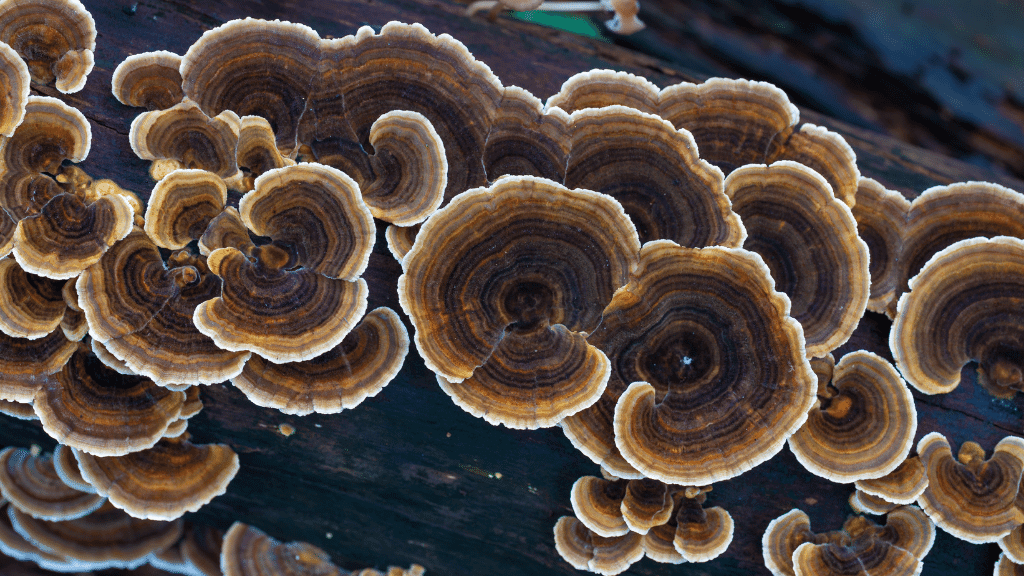
In this blog post, we’re going to dive deeper into the potential benefits of utilizing turkey tail mushrooms in cancer care, cancer support, and cancer prevention.
Remember, always talk to your doctor before incorporating any functional mushroom into your daily routine.
Before we get into it, let’s quickly take a look back at the history of turkey tail mushrooms and cancer research.
The history of turkey tail mushrooms & cancer
The use of turkey tail mushrooms for health treatments started thousands of years ago in Eastern medicine - in particular, the Chinese culture has regarded turkey tail mushrooms as a healer that is beneficial to spirit, energy, and body.
Practitioners of traditional Chinese medicine have long prescribed turkey tail in tea format to help reduce fatigue, boost stamina, relieve joint pain, balance blood sugar, relieve coughs and asthma, and improve spleen dysfunction (e.g., bloating, vomiting, weakness, and diarrhea).
The belief in this mushroom species’ healing compounds is still held today, but with more studies to back it up. As more research has been done on the mushroom’s makeup and health benefits, the Japanese and Chinese cultures have introduced turkey tail as a complementary treatment for various types of cancer.
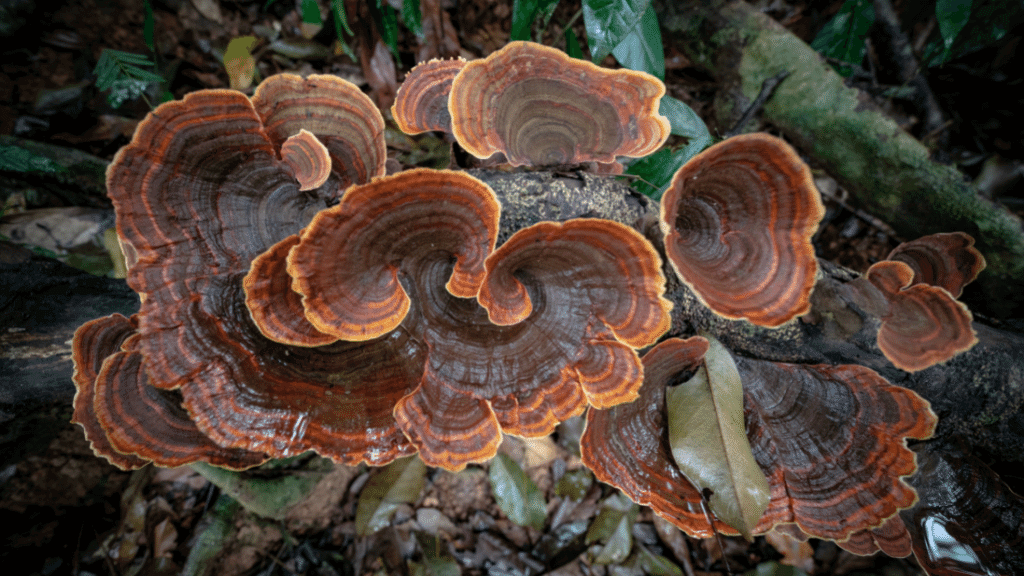
In 1983, Polysaccharide-K (PSK) extract derived from turkey tail mushrooms was approved by the Chinese government as a vital addition to traditional chemotherapy treatment. This work is still regarded as a huge turning point for cancer treatment research today. PSK is mentioned in numerous immuno-oncology studies, as it’s been recognized for its positive role in helping aid the body’s defenses against cancer.
Clinical studies are ongoing on PSK/turkey tail mushroom linkages to cancer care. As we learn more and start to understand how natural therapies can be used alongside traditional cancer treatments, medicinal mushrooms are really earning their spot at the table in this conversation.
Do other mushrooms - besides turkey tail - help with cancer support?
Short answer: Yes.
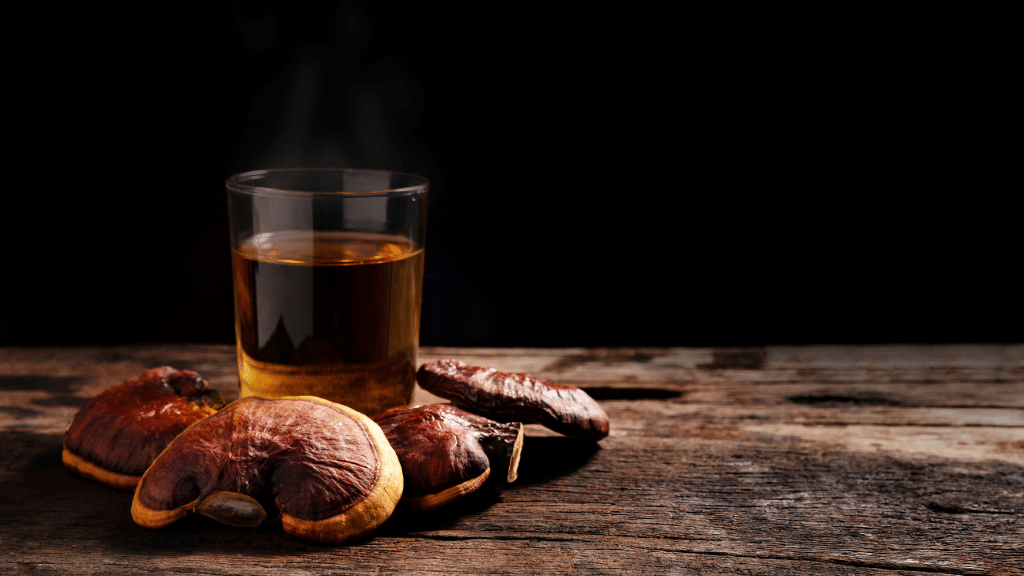
reishi mushrooms are also thought to have strong immune-boosting properties
Today, we have a growing body of studies that link various nutrients found in and derived from mushrooms to better cancer outcomes. Beyond turkey tail mushrooms, the top mushrooms for cancer support are reishi, shiitake, chaga, and split gill. In fact, Chinese healers have used more than 100 types of mushrooms to help with cancer care for centuries.
If you're interested in a more diverse mushroom approach, check out our guide to using medicinal mushrooms for cancer support here.
For the purpose of this blog post, we will be focusing on turkey tail mushrooms for cancer treatment, but we felt it was important to note that they’re not the only mushroom linked to positive outcomes for cancer patients.
Understanding the beneficial compounds in turkey tail mushrooms
As mentioned prior, turkey tail mushrooms are packed with:
- Antioxidants
- The highest percentage of beta-glucans (more than 50% of the mushroom’s makeup) of all mushrooms
- Polysaccharopeptides (PSK), including krestin and polysaccharide peptide (PSP), that are shown to boost the body’s immune response
But they also contain:
- Triterpenes: Part of the mushroom membrane, triterpenes act as precursors to natural steroids
- Sterols: These hormone precursors convert to vitamin D2 when exposed to sunlight
- Polyphenols (e.g., flavonoids): This naturally occurring compound is produced in response to environmental stressors and associated with positive benefits when consumed regularly
- Vitamins and minerals: Selenium, vitamin B3, and vitamin D have all been shown in the makeup of turkey tail mushrooms
This nutrient-dense makeup is what makes turkey tail not only a great potential treatment supplement for cancer and chemotherapy, but also just overall health and wellbeing on a daily basis.
When thinking about utilizing turkey tail mushrooms for cancer support, beta-glucans arguably play the most important role in why this mushroom above all is a cancer-fighting powerhouse. So let’s take a look at what beta-glucans are and why they matter for cancer support.
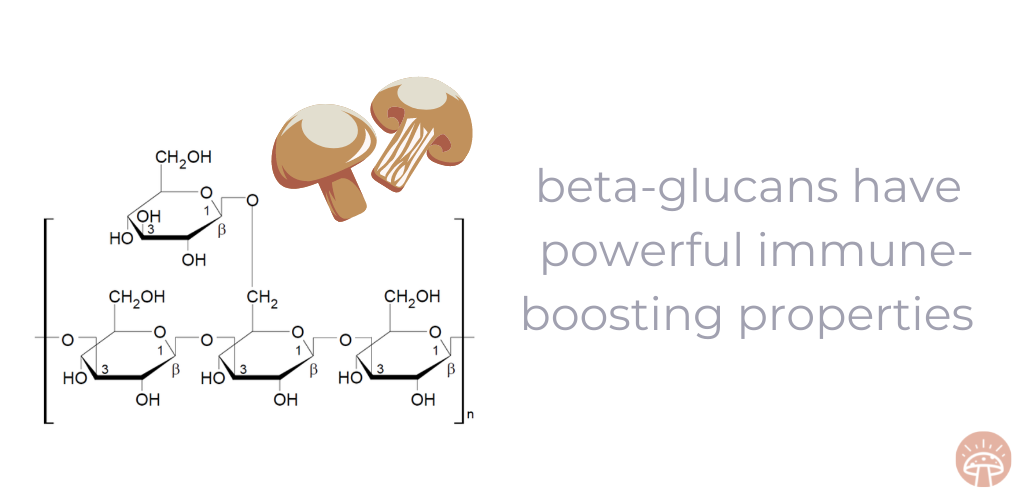
What are beta-glucans? Why do they matter for cancer support?
Beta-glucans are a fiber found in the cell walls of various living organisms, including:
- Baker’s yeast
- Good bacterias
- Algae (e.g., seaweed)
- Grains (e.g., oats, barley, etc.)
The organisms that contain beta-glucans utilize them as a source of energy to power the organism. What’s unique about beta-glucans is that they are biologically active and have been shown in various studies to play a role in potential health benefits. However, it’s important to note that humans cannot make beta-glucans on their own.
With this in mind, that’s why many people are turning to medicinal mushrooms as a natural source of beta-glucans. Beta-glucans have been shown to be tightly bound with a tough amino-glucose polymer called chitin - a compound that’s found in the cell walls of medicinal mushrooms, but also in the shells of insects and crustaceans.
Check out our complete guide to beta-glucans for more detail.
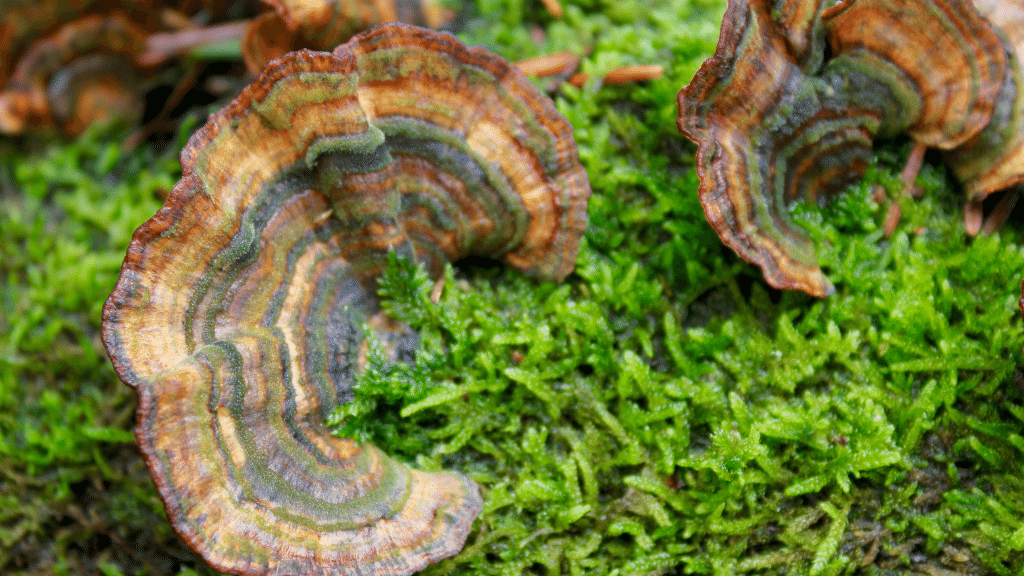
As for turkey tail mushrooms, the species has some of the highest beta-glucan content with 60.8% beta-glucan content by weight in the cap alone. For comparison, reishi has 54.0% beta-glucan content by weight in the cap, followed by maitake at 26%. Bar none, turkey tail mushroom beta-glucan content wins out.
To learn more about beta-glucans and medicinal mushrooms, check out out blog post that dives mush (and we mean, mush) deeper.
What is PSK extract? Why does it matter for cancer support?
If you saw the mentions of PSK above and were waiting patiently to get to that portion of the blog post…welcome! As mentioned before, studies have found that turkey tail extract contains Krestin (PSK) and Polysaccharide Peptide (PSP) - both of these compounds promote immune response by activating certain immune cells and, in tandem, suppressing inflammation cells. PSK and PSP are also shown to enhance white blood cell creation. These facts on the overall immune boosting compounds of turkey tail make it a great mushroom choice for supporting and/or treating cancer.
For decades, PSK has been approved as a mushroom supplement product and is regularly used for cancer treatment in Japan. In fact, a proprietary product created by the Kureha Corporation has been used as an adjunct cancer treatment for thousands of patients since the mid-1970s across the Eastern world with little-to-no adverse effects shown.
PSK is also being studied in the western world today and in 2012, the FDA approved turkey tail extract for use alongside traditional chemotherapy for prostate cancer patients for the first time.
As more studies continue to come out and the use of mushrooms for general health and wellbeing becomes more widely known, we expect more scientific information sourced from Western resources will become available for consumption. In the meantime, we rely on the immense amount of studies conducted by the Japanese and Chinese to back up the use of turkey tail mushrooms for immune support and cancer treatment.
Benefits of turkey tail mushroom for cancer support
After many people receive a devastating cancer diagnosis, it’s natural to chat about the appropriate next steps and treatment options with a trusted physician.
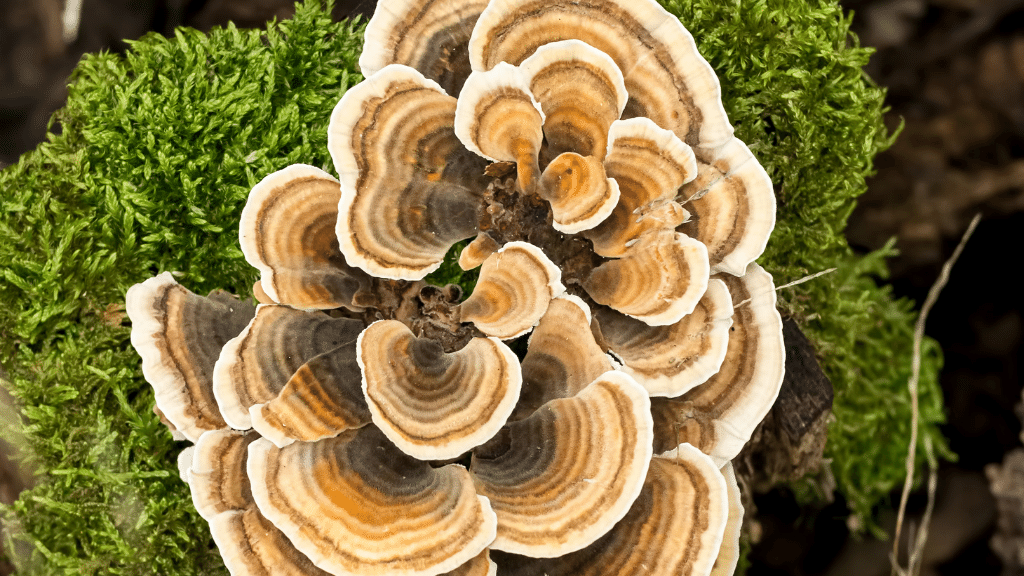
As the Western world adopts more natural therapies for diagnoses like cancer, we expect turkey tail mushroom to be a regular conversation piece for cancer care. Turkey tail is not a miracle supplement. But it may be a valuable addition to your treatment plan.
Studies have shown that turkey tail extract supplementation may:
- Improve health results and longevity more than just chemotherapy alone
- Better quality of life for patients
- Prevent secondary cancerous cells from forming after chemotherapy
- Protect healthy cells from free radicals
- Provide immunoprotective properties for those who are already immunocompromised and diagnosed with cancer
All good things - especially since almost no potential interactions or side effects have been documented to-date. With that, let’s quickly cover…
The potential interactions & side effects of turkey tail mushrooms
Although many studies on turkey tail mushrooms have shown promising results for cancer treatment and immunotherapy, it is not approved at this time for wide use in Western medicine. However, this edible, non-hallucinogenic mushroom has had very few adverse effects associated with its use worldwide. The six documented potential side effects of taking turkey tail include:
- Heartburn
- Cold/flu symptoms
- Constipation and stomach pain
- Rash
- Darkened nail pigmentation
- Diarrhea (darkened stool)
Also, it’s generally recommended to avoid taking turkey tail mushrooms if you are pregnant or breastfeeding.
The good news is that, even with side effects presenting themselves in some cases, it’s never been documented that someone has had irreversible side effects from taking turkey tail.
Out of all the research conducted on turkey tail mushrooms, reputable information on possible Rx drug interactions is lacking. Today, there have been no reported negative interactions when traditional medications and turkey tail have been taken in tandem, but that doesn’t mean it’s impossible. If you are taking medication and would like to start taking turkey tail, consider talking to your doctor before you start dosing regularly.
With all of this in mind, it’s still important to consider that turkey tail consumption affects each person differently. People who have pre-existing health conditions or are allergic to mushrooms or mold should consult a trusted healthcare professional before consuming turkey tail.
You can learn more about the potential side effects and interactions of turkey tail mushrooms by visiting our blog post on the topic.
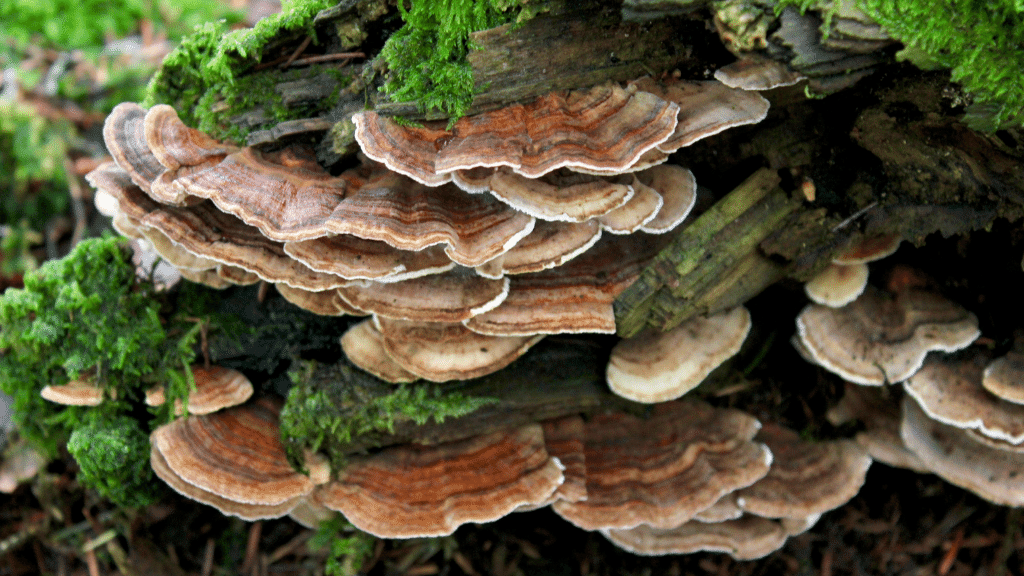
Turkey tail studies & trials by cancer type
With turkey tail being one of the most rigorously tested mushrooms as a whole, there are numerous studies, both past and ongoing, on its use in cancer treatment and prevention. Let’s dive into those studies a bit more and give some examples of clinical trials by cancer type.
Antitumor
In a study conducted on PSP effects on anti-tumor properties, it was found that PSP increased white blood cell count, making it an effective treatment enhancer.
Colon cancer
In a study that measured PSK effectiveness in treating colon cancer cells, it was found that PSK suppressed the development of new colon cancer cells.
Gastric cancer
In Japan, a study was conducted on 262 patients that were randomly assigned either standard gastric cancer treatment or treatment supplemented with PSK. Results showed that PSK improved both the five-year disease-free rate and five-year survival rate overall.
Leukemia
When looking at turkey tail as a potential treatment for leukemia, scientists conducted an in-vitro study (e.g., a study conducted on cells outside of a living organism). Over a three-day period, growth suppression and viability of the leukemic cells was shown.
Breast cancer
In a study conducted on women diagnosed with breast cancer stages 1 through 3 who had undergone surgery and chemotherapy, 9 grams of turkey tail was given daily to measure immune response. It was shown to be safe and effective, with positive indication that supplementation helped with immune response. SOURCE
Prostate cancer
A team of scientists at Bastyr University in Seattle got the greenlight from the FDA to use PSK (turkey tail extract) in prostate cancer and breast cancer clinical trials. They’re hopeful the information yielded from these trials will lead to further investigation into PSK usage in cancer support for patients across the country.
Beyond these cancer types and various clinical studies, research shows that the presence of turkey tail extract as an added supplement to chemotherapy may reduce the possibility that secondary cancer cells appear in the body as the person is recovering and undergoing treatment. Results also showed that daily concentrated turkey tail mushroom crude extract consumption over a five year period improved lifespan over those that just underwent chemotherapy alone. Food for thought!
How to take turkey tail supplements
As you start to consider turkey tail mushroom supplementation to aid in cancer care or support, it’s important that you always work with your doctor when incorporating supplements into your immunity routine. You need to consider health status, dosage, and more. Supplements can come in many formats including:
- Turkey tail powder: Turkey tail powder, a.k.a. powdered turkey tail mushroom, has been used as a supplement for decades. Turkey tail powder can be mixed into your favorite beverage of choice.
- Turkey tail extract: Turkey tail extract takes turkey tail powder and boils it down using a non-alcoholic liquid boiling process to make a liquid extract. Similar to the powder, this product can easily be added to your favorite beverage or food item.
- Turkey tail extract capsules: If turkey tail extract or tincture isn’t for you, consider taking it in a capsule format with turkey tail capsules.
- Turkey tail tincture: Turkey tail alcohol-based tinctures are considered inferior to turkey tail extracts because active beta-glucans are not soluble in alcohol. Similar to turkey tail extract, turkey tail tincture comes in a liquid format.
We've put together a complete guide to taking turkey tail supplements here.
Before diving into research about a specific product type, let's cover dosage recommendations for turkey tail usage by cancer patients and what to look for in a product.
Turkey tail dosage for cancer
If you’re considering taking turkey tail to enhance cancer treatment or aid in a cancer diagnosis, it’s recommended to first consult your doctor. If they agree that’s a good choice for your health, they may recommend you take up to 3 grams of turkey tail PSK concentrate per day alongside traditional chemotherapy.
You’ll want to work out your specific dosage with your oncologist and/or primary care doctor.
Some sources recommend 1-3 grams for daily health maintenance. This dosage can jump up to 27 grams a day for acute conditions.
This will differ person-to-person based on health status, weight, height, and body composition. You should never guess at your appropriate dosage. Work with your oncologist for accurate dosage recommendations based on your unique situation and supplement type.
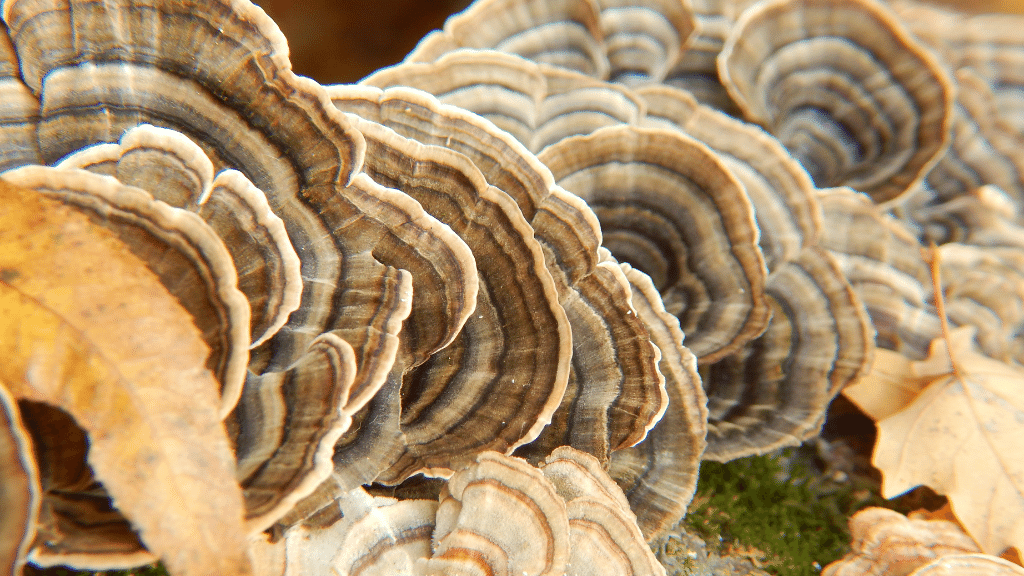
What to look for in turkey tail products
When looking for commercially sold turkey tail products, there are a few considerations to take into consideration:
- Find a trusted brand: Finding your trusted brand of mushroom products depends on a few things, but a good place to start is by reading reviews of different companies from consumers that have tried their products. When doing this, take all super positive and super negative reviews with a grain of salt and look for reviews that provide analysis of the company’s products in a balanced way. For a cancer support product, you’ll also want to consider if your product is organic - simply look for “USDA organic” on the packaging for validity.
- Review the product’s ingredients: You’ll want to look behind the curtain at how the company creates its products and at the creation process itself before purchasing any mushroom products. For example, with turkey tail, a supplement product that contains both fruiting bodies and mycelium is preferable over a product that just has one or the other.
As another example, when looking at commercial turkey tail products, capsules derived from mycelium grown on rice may contain fewer beta-glucans and higher levels of starch. Ingredient use and product makeup is a little look inside at how a company creates its products and what standards you require for your mushroom supplements. - Evaluate the certificate of analysis: Legitimate mushroom companies will publish a certificate of analysis (CoA) that details the testing process, ingredients used, and methodology for their products. The CoA can give some peace of mind that you’re choosing a product that’s been highly tested and contains only the good ingredients you’re looking to put into your body. For turkey tail, specifically, you’ll want to find a product that has a guaranteed beta-glucan analysis of at least 15% - but higher amounts may be more effective for cancer treatment.
- Look for proper extraction: When reviewing a product, the extraction process will be broken down for you in the CoA provided by the company (see above for details). If the extraction process is important to you - and especially if you’d prefer an extract over a tincture - ensure you’re reviewing the company’s extraction process. For turkey tail, you’ll want to look for a hot water extraction process because beta-glucans are not alcohol soluble. If you’re using a tincture, be sure to analyze the extraction process in greater detail to ensure it’s a dual extraction with water and alcohol.
- Consider how you consume it: It is recommended to steep your extract powder product for at least 10 to 15 minutes to further release the most active compounds. Once steeped, drink it as a tea.
The Best Turkey Tail Supplements for Cancer Support
Here at Remeday, it's our goal to help our readers identify the most quality mushroom products. We rate all products on their quality, sourcing, transparency, potency, and safety testing. And - we only ever recommend products we've tried ourselves and would suggest to family and friends.
With that in mind, here are some of the most trusted mushroom brands:
Real Mushrooms Turkey Tail Powder
Real Mushrooms has been a leader when it comes to product sourcing, quality, and transparency. If you're looking for a high quality, proven, extracted mushroom supplement, there really isn't anything better than Real Mushrooms. Simply measure out your powder and add it to your morning coffee or tea. It's as easy as that.
Rainbo Turkey Tail Tincture
If tinctures are more your speed, then we highly recommend the folks over at Rainbo. When it comes to product potency, quality, and processing, Rainbo meets all the marks. Not to mention, Rainbo takes enormous strides to contribute to ethical causes. So you can feel good about supporting their business.
Now that we’ve explained the ins and outs of turkey tail and cancer treatment, maybe you’re curious to learn more about turkey tail health benefits, potential side effects, and more.
If so, consider visiting our blog to find more information on this cancer-fighting powerhouse mushroom and even more information about other medicinal mushroom species.
Thanks for being here with us! It means so mush.

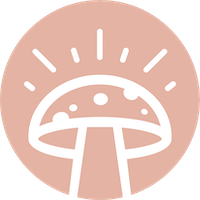



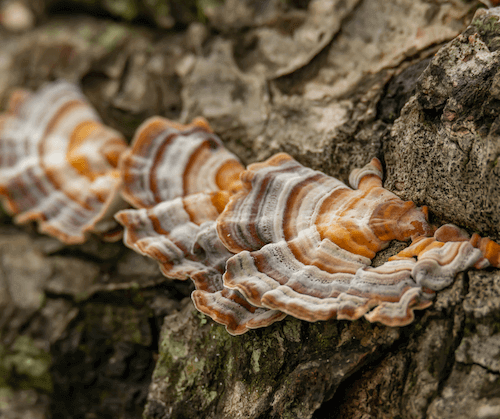
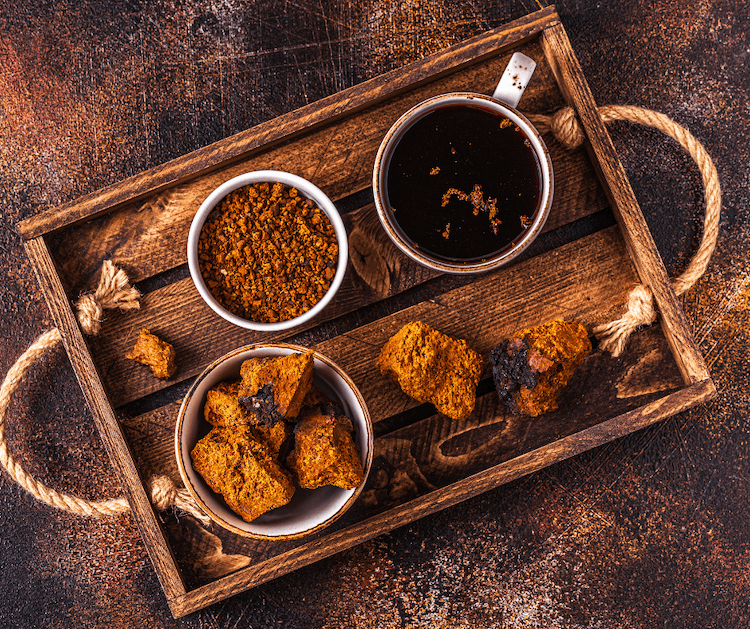


.png)
